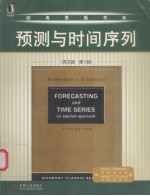图书介绍
预测与时间序列 第3版PDF|Epub|txt|kindle电子书版本网盘下载

- (美)鲍尔曼(Bowerman,B.L.),(美)奥康奈尔(Oconnell,R.T.)著 著
- 出版社: 北京:机械工业出版社
- ISBN:7111124103
- 出版时间:2003
- 标注页数:726页
- 文件大小:23MB
- 文件页数:740页
- 主题词:数学预测-高等学校-教材-英文;时间序列分析-高等学校-教材-英文
PDF下载
下载说明
预测与时间序列 第3版PDF格式电子书版下载
下载的文件为RAR压缩包。需要使用解压软件进行解压得到PDF格式图书。建议使用BT下载工具Free Download Manager进行下载,简称FDM(免费,没有广告,支持多平台)。本站资源全部打包为BT种子。所以需要使用专业的BT下载软件进行下载。如BitComet qBittorrent uTorrent等BT下载工具。迅雷目前由于本站不是热门资源。不推荐使用!后期资源热门了。安装了迅雷也可以迅雷进行下载!
(文件页数 要大于 标注页数,上中下等多册电子书除外)
注意:本站所有压缩包均有解压码: 点击下载压缩包解压工具
图书目录
PART ⅠINTRODUCTION1
CHAPTER 1AN INTRODUCTION TO FORECASTING2
1.1 Introduction2
1.2 Forecasting and Time Series3
1.3 Forecasting Methods8
1.4 Errors in Forecasting12
1.5 Choosing a Forecasting Technique17
1.6 An Overview of Quantitative Forecasting Techniques19
1.7 Computer Packages:Minitab and SAS23
Exercises23
CHAPTER 2 BASIC STATISTICAL CONCEPTS26
2.1 Populations27
2.2 Probability29
2.3 Random Samples and Sample Statistics31
2.4 Continuous Probability Distributions34
2.5 The Normal Probability Distribution36
2.6 The t-Distribution,the F-Distribution,and the Chi-Square Distribution45
2.7 Confidence Intervals for a Population Mean48
2.8 Hypothesis Testing for a Population Mean58
Exercises72
PART Ⅱ FORECASTING BY USING REGRESSION ANALYSIS76
CHAPTER 3 SIMPLE LINEAR REGRESSION77
3.1 The Simple Linear Regression Model78
3.2 The Least Squares Point Estimates86
3.3 Point Estimates and Point Predictions90
3.4 Model Assumptions,the Mean Square Error,and the Standard Error93
3.5 Testing the Significance of the Independent Variable97
3.6 A Confidence Interval for a Mean Value of the Dependent Variable and a Prediction Interval for an Individual Value of the Dependent Variable104
3.7 Simple Coefficients of Determination and Correlation112
3.8 An F-Test for the Simple Linear Regression Model118
3.9 Using the Computer121
Exercises122
CHAPTER 4 MULTIPLE REGRESSION131
4.1 The Linear Regression Model132
4.2 The Least Squares Point Estimates144
4.3 Point Estimates and Point Predictions149
4.4 The Regression Assumptions and the Standard Error153
4.5 Multiple Coefficients of Determination and Correlation156
4.6 An F-Test for the Overall Model159
4.7 Statistical Inference for βj and Multicollinearity161
4.8 Confidence Intervals and Prediction Intervals166
4.9 An Introduction to Model Building172
4.10 Residual Analysis179
4.11 Using the Computer198
Exercises200
CHAPTER 5 TOPICS IN REGRESSION ANALYSIS214
5.1 Interaction215
5.2 An F-Test for a Portion of a Model226
5.3 Using Dummy Variables to Model Qualitative Independent Variables230
5.4 Advanced Concepts of Multicollinearity240
5.5 Advanced Model Comparison Methods248
5.6 Stepwise Regression,Forward Selection,Backward Elimination,and Maximum R2 Improvement255
5.7 Outlying and Influential Observations260
5.8 Handling Unequal Variances266
5.9 Using the Computer270
Exercises273
PART Ⅲ FORECASTING BY USING TIME SERIES REGRESSION,DECOMPOSITION METHODS,AND EXPONENTIAL SMOOTHING289
CHAPTER 6 TIME SERIES REGRESSION290
6.1 Modeling Trend by Using Polynomial Functions291
6.2 Detecting Autocorrelation301
6.3 Types of Seasonal Variation308
6.4 Modeling Seasonal Variation by Using Dummy Variables and Trigonometric Functions316
6.5 Growth Curve Models325
6.6 Handling First-Order Autocorrelation330
6.7 Using the Computer337
Exercises342
CHAPTER 7 DECOMPOSITION METHODS354
7.1 Multiplicative Decomposition355
7.2 Additive Decomposition368
7.3 Shifting Seasonal Patterns370
7.4 The Census II Decomposition Method and SAS PROC X11373
7.5 Using the Computer374
Exercises375
CHAPTER 8 Exponential Smoothing379
8.1 Simple Exponential Smoothing380
8.2 Adaptive Control Procedures386
8.3 Double Exponential Smoothing389
8.4 Winters'Method403
8.5 Exponential and Damped Trends421
8.6 Prediction Intervals427
8.7 Concluding Comments430
8.8 Using the Computer431
Exercises431
PART Ⅳ FORECASTING BY USING BASIC TECHNIQUES OF THE BOX-JENKINS METHODOLOGY435
CHAPTER 9 NONSEASONAL BOX-JENKINS MODELS AND THEIR TENTATIVE IDENTIFICATION436
9.1 Stationary and Nonstationary Time Series437
9.2 The Sample Autocorrelation and Partial Autocorrelation Functions:The SAC and SPAC441
9.3 An Introduction to Nonseasonal Modeling and Forecasting457
9.4 Tentative Identification of Nonseasonal Box-Jenkins Models467
9.5 Using the Computer477
Exercises478
CHAPTER 10 ESTIMATION,DIAGNOSTIC CHECKING,AND FORECASTING FOR NONSEASONAL BOX-JENKINS MODELS487
10.1 Estimation488
10.2 Diagnostic Checking496
10.3 Forecasting502
10.4 A Case Study504
10.5 Using the Computer512
Exercises514
CHAPTER 11 AN INTRODUCTION TO BOX-JENKINS SEASONAL MODELING521
11.1 Transforming a Seasonal Time Series into a Stationary Time Series521
11.2 Two Examples of Seasonal Modeling and Forecasting533
11.3 Using the Computer550
Exercises552
PART Ⅴ FORECASTING BY USING ADVANCED TECHNIQUES OF THE BOX-JENKINS METHODOLOGY566
CHAPTER 12 GENERAL BOX-JENKINS SEASONAL MODELING567
12.1 The General Seasonal Model and Guidelines for Tentative Identification568
12.2 Improving an Inadequate Seasonal Model581
12.3 Using the Computer595
Exercises596
CHAPTER 13 USING THE BOX-JENKINS METHODOLOGY TO IMPROVE TIME SERIES REGRESSION MODELS AND TO IMPLEMENT EXPONENTIAL SMOOTHING606
13.1 Box-Jenkins Error Term Models in Time Series Regression607
13.2 Seasonal Intervention Models618
13.3 Box-Jenkins Implementation of Exponential Smoothing625
13.4 Using the Computer639
Exercises643
CHAPTER 14 TRANSFER FUNCTIONS AND INTERVENTION MODELS657
14.1 A Three-Step Procedure for Building a Transfer Function Model658
14.2 Intervention Models677
14.3 Using the Computer689
Exercises694
APPENDIX A STATISTICAL TABLES706
APPENDIX B REFERENCES716
Index719